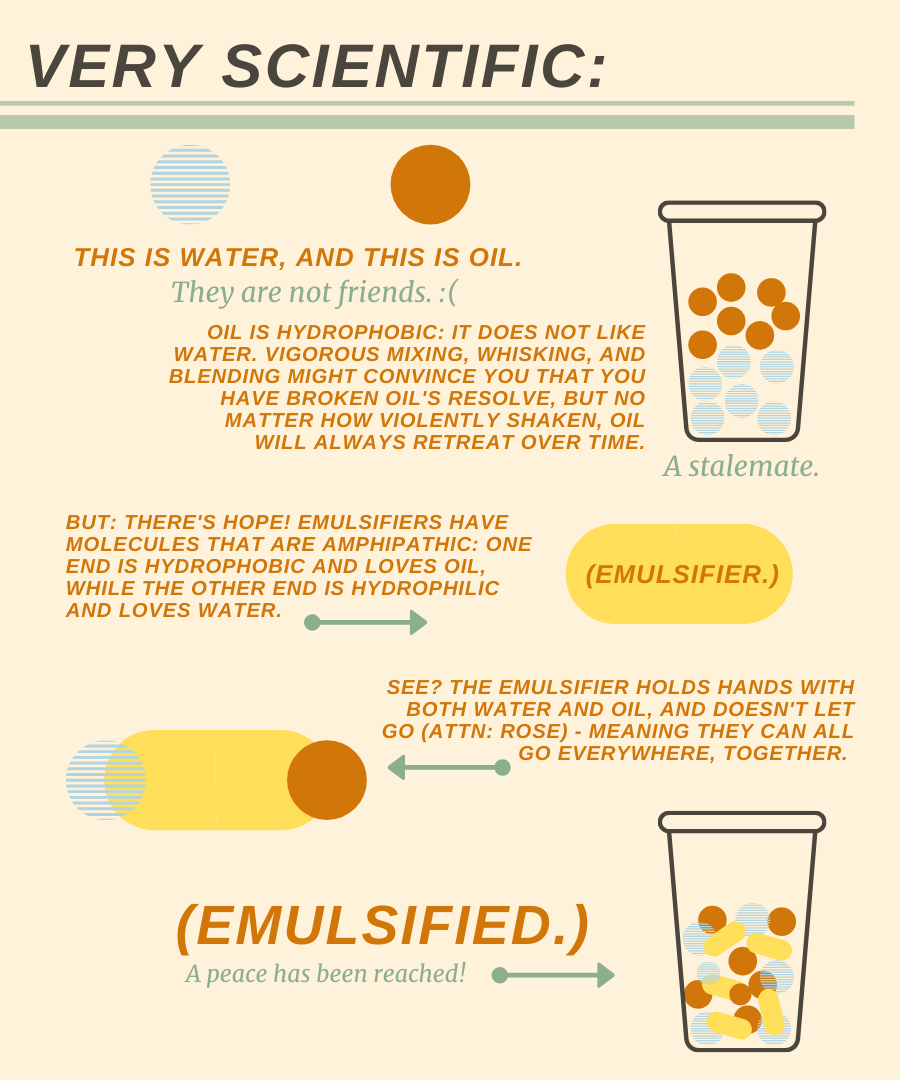Emulsifier In Food for Vegan Meal Prep
Wiki Article
Why It Is Essential to Include an Emulsifier in Food for Ideal Preference and Top Quality
Emulsifiers play a critical role in food manufacturing by guaranteeing the stable blending of immiscible fluids, such as oil and water. They reduce interfacial tension, which protects against the separation of components and adds to a consistent texture. This not just boosts mouthfeel however likewise influences taste perception. Recognizing the requirement of emulsifiers reveals deeper understandings into their function and value in culinary applications. What effects does this have for food innovation and consumer choices?Understanding Emulsifiers: The Fundamentals
Emulsifiers play an essential role in food science, serving as representatives that promote the mixing of 2 immiscible fluids, such as oil and water. These substances possess both hydrophilic (water-attracting) and hydrophobic (water-repelling) buildings, which allow them to stabilize emulsions. Common emulsifiers consist of lecithin, found in egg yolks and soybeans, and mono- and diglycerides, stemmed from fats.The Science Behind Emulsification
When 2 immiscible liquids are incorporated, the procedure of emulsification comes to be fundamental for achieving a secure mix. Emulsification involves spreading one liquid within another, generally oil in water or vice versa. This procedure takes place with mechanical anxiety, which breaks the larger beads right into smaller sized ones, therefore raising the surface location. Nevertheless, without the presence of emulsifiers, these droplets would certainly integrate, bring about splitting up.Emulsifiers are molecules with hydrophilic (water-attracting) and hydrophobic (water-repelling) properties. Their special structure permits them to lower the interfacial tension between the 2 immiscible liquids, stabilizing the solution. This stabilization stops separation and boosts the harmony of appearance and taste. The interactions at the molecular degree are vital for preserving the integrity of the solution, guaranteeing that food keep their desired consistency and preference. Understanding this scientific research is considerable for food scientists and manufacturers in producing high-quality foodstuff.
Sorts Of Emulsifiers Utilized in Food
The sorts of emulsifiers used in food can be extensively classified into all-natural and synthetic ranges. Common food emulsifiers, such as lecithin and mono- and diglycerides, play an essential duty in enhancing food security and appearance. Recognizing these distinctions is necessary for appreciating just how emulsifiers contribute to the general top quality of food.Natural vs. Synthetic Emulsifiers
While both synthetic and natural emulsifiers offer the essential function of supporting mixes in food, their qualities and beginnings differ considerably. All-natural emulsifiers, originated from plant or animal sources, consist of lecithin, casein, and particular gum tissues. They are often regarded as healthier options, attracting customers seeking clean-label items. In contrast, synthetic emulsifiers, such as mono- and diglycerides, are chemically crafted and may offer enhanced stability and functionality in a broader variety of applications. These synthetic choices can be much more cost-effective and offer consistent quality. They may evoke apprehension among health-conscious customers. Eventually, the selection in between artificial and natural emulsifiers depends upon the preferred top qualities of the food, including texture, flavor, and shelf-life stability.Common Food Emulsifiers
Emulsifiers play a necessary duty in the food sector, making certain the stability and appearance of numerous items. Usual food emulsifiers include lecithin, mono- and diglycerides, and polysorbates. Emulsifier In Food. Lecithin, originated from sources like soybeans and egg yolks, is extensively used in baked items and delicious chocolates. Mono- and diglycerides, frequently acquired from vegetable oils, boost the creaminess of margarine and ice cream. Polysorbates, artificial emulsifiers, are regularly found in salad dressings and sauces, promoting a smooth uniformity. Various other emulsifiers such as xanthan gum tissue and guar periodontal, both natural thickeners, also contribute to the desired structure in various foodstuff. Each emulsifier type offers specific purposes, adding to the general high quality and appeal of food things
Function in Food Security
Food stability is greatly influenced by the sorts of emulsifiers utilized, which aid prevent the splitting up of components in various solutions. Emulsifiers such as lecithin, mono- and diglycerides, and polysorbates play vital functions in maintaining the harmony of items like dressings, sauces, and gelato. Lecithin, originated from soy or egg yolk, is especially efficient because of its all-natural properties, while mono- and diglycerides boost structure and service life. Polysorbates, on the other hand, boost the security of oil-in-water emulsions, making them suitable for baked products. The option of emulsifier depends on the particular food application and wanted qualities, ensuring that items stay secure, enticing, and of high quality throughout their designated rack life.Exactly How Emulsifiers Improve Texture and Mouthfeel
Enhancing the sensory experience of food, emulsifiers play a vital role in boosting texture and mouthfeel. These compounds promote the uniform distribution of components, enabling a smoother and creamier uniformity in items such as dressings, sauces, and gelato. By stabilizing blends of oil and water, emulsifiers protect against splitting up, causing a natural structure that enhances the general consuming experience.
In addition, emulsifiers can change the viscosity of foodstuff, adding to a desirable density or creaminess. This change of appearance can affect just how food really feels in the mouth, impacting satisfaction and satisfaction. In addition, by developing a steady solution, emulsifiers assist keep the honesty of the item, guaranteeing that the desired mouthfeel is regularly delivered in time. In general, the application of emulsifiers is essential for achieving the ideal texture and mouthfeel, ultimately elevating the top quality of food.
The Duty of Emulsifiers in Taste Improvement
Flavor improvement in culinary applications commonly depends upon the reliable usage of emulsifiers. These substances help with the mixing of water and oil, permitting the even distribution of taste compounds within food products. By creating stable emulsions, emulsifiers aid to encapsulate and release unpredictable flavors, boosting the overall sensory experience.On top of that, emulsifiers can boost the understanding of taste by affecting the mouthfeel and texture of dishes. A smoother, a lot more cohesive item can result in a heightened assumption of tastes, making them more obvious and pleasurable. Moreover, emulsifiers can safeguard delicate flavors from destruction, guaranteeing that they continue to be intact throughout processing and storage space.
Emulsifiers in Popular Food Products
Just how do emulsifiers add to the structure and security of popular food? Emulsifiers play a vital function in various commonly consumed products. In salad dressings, they ensure a smooth mix of oil and vinegar, stopping splitting up and improving mouthfeel. In ice lotion, emulsifiers develop a velvety texture by maintaining air bubbles, resulting helpful hints in a rich and indulgent product. Baked products, such as bread and cakes, gain from emulsifiers by enhancing volume and crumb framework, leading to a lighter and extra appealing structure. Additionally, mayo counts on emulsifiers to preserve its thick uniformity and stop oil separation. Margarine and spreads likewise use emulsifiers to accomplish a spreadable structure while preserving security. These instances highlight the substantial influence of emulsifiers on the quality and enjoyment of daily foodstuff, emphasizing their relevance in modern-day food formulation.The Future of Emulsifiers in Food Development
The future of emulsifiers in food innovation is noted by substantial innovations in modern technology, paving the method for new formulas. Furthermore, the demand for much healthier emulsifier options is rising, motivating scientists to check out all-natural and plant-based choices. Lasting sourcing techniques are likewise becoming essential, as customers increasingly prioritize ecological obligation in their food choices.Innovations in Emulsifier Modern Technology
As researchers proceed to discover the molecular complexities of emulsifiers, significant improvements are emerging that pledge to change food important site technology. Recent advancements focus on producing a lot more versatile and efficient emulsifiers that improve structure, stability, and taste in different foodstuff. Developments in biopolymer-based emulsifiers are gaining grip, using boosted sustainability and efficiency over standard alternatives. Additionally, advancements in nanotechnology are enabling the style of emulsifiers at the molecular degree, which can lead to finer emulsions and improved sensory experiences. These technical breakthroughs are not just boosting item top quality but additionally expanding the variety of applications for emulsifiers in the food sector. As these advancements unfold, they are anticipated to redefine cooking possibilities and consumer choices in the future.Healthier Emulsifier Alternatives
While conventional emulsifiers have played a necessary duty in food manufacturing, there is a growing demand for healthier options that line up with customer choices for all-natural active ingredients and tidy tags. Technologies in plant-based emulsifiers, such as those stemmed from flaxseed, sunflower, and soy, have actually gained popularity due to their regarded health and wellness benefits. These alternatives usually consist of fewer additives and offer functionality similar to artificial emulsifiers. In addition, components like aquafaba, the fluid from prepared chickpeas, have actually emerged as versatile emulsifying agents, attracting vegan and health-conscious consumers. Emulsifier In Food. The change towards these much healthier emulsifiers not just enhances the appeal of food products yet also sustains the fad of transparency in ingredient sourcing, ultimately promoting consumer trust and complete satisfaction
Sustainable Sourcing Practices
Sustainable sourcing techniques are becoming progressively essential in the growth of emulsifiers, reflecting a broader commitment to ecological duty within the food market. Manufacturers are now prioritizing the usage of renewable energies, such as plant-based ingredients, which reduces the carbon impact connected with traditional emulsifiers. This shift not just sustains biodiversity however likewise advertises moral farming techniques that profit local neighborhoods. Additionally, improvements in innovation make it possible for the extraction and handling of emulsifiers with minimized environmental influence. By adopting sustainable sourcing, firms improve their brand image while fulfilling customer need for openness and eco-friendliness. As the food sector remains to develop, the assimilation of sustainable emulsifiers will certainly play an essential duty fit future advancements, ensuring an equilibrium in between quality and environmental stewardship.Often Asked Questions
Are Emulsifiers Safe for People With Food Allergies?

Can Emulsifiers Affect the Nutritional Worth of Food?
Emulsifiers can influence the nutritional value of food by enhancing nutrient absorption or possibly altering the bioavailability of certain substances. Their results vary extensively depending on the type of emulsifier and the total food formulation.Exactly How Do Emulsifiers Influence Service Life of Products?
Emulsifiers enhance the life span of products by maintaining mixtures, stopping splitting up, and reducing perishing. This security aids maintain texture and flavor in time, eventually making certain food continues to be enticing and safe for longer durations.What Are Common All-natural Emulsifiers Discovered in Home Kitchens?
Usual natural emulsifiers discovered in home cooking areas include egg yolks, mustard, soy, and honey lecithin. These active ingredients help maintain mixtures by reducing surface stress between oil and water, boosting texture and uniformity in numerous dishes.Exist Any Type Of Interest In Artificial Emulsifiers in Food?
Concerns concerning artificial emulsifiers in food include possible gastrointestinal issues, inflammatory responses, and links to weight problems. Some research studies suggest these additives might interfere with digestive tract microbiota, questioning regarding their long-term web link results on health and well-being.Common food emulsifiers, such as lecithin and mono- and diglycerides, play a vital role in boosting food security and structure. Emulsifiers play a crucial duty in the food sector, making sure the stability and appearance of numerous products - Emulsifier In Food. Other emulsifiers such as xanthan gum and guar gum tissue, both natural thickeners, additionally add to the preferred texture in various food products. Recent developments concentrate on producing much more functional and effective emulsifiers that enhance texture, stability, and taste in various food products. Emulsifiers can posture dangers for people with food allergic reactions, as some emulsifiers are acquired from irritants like soy or eggs
Report this wiki page